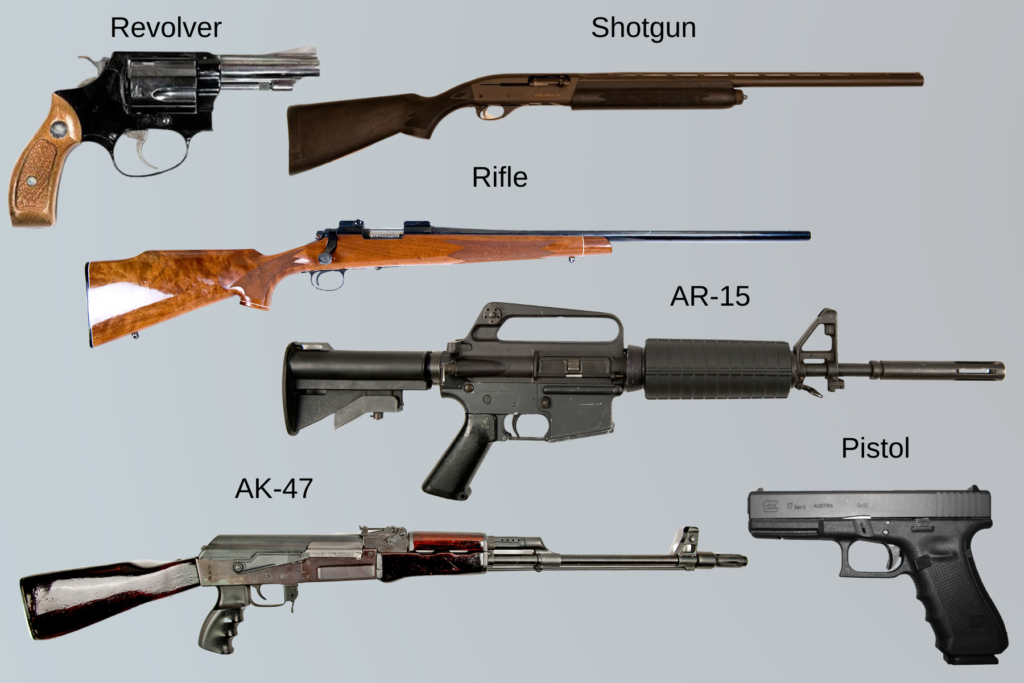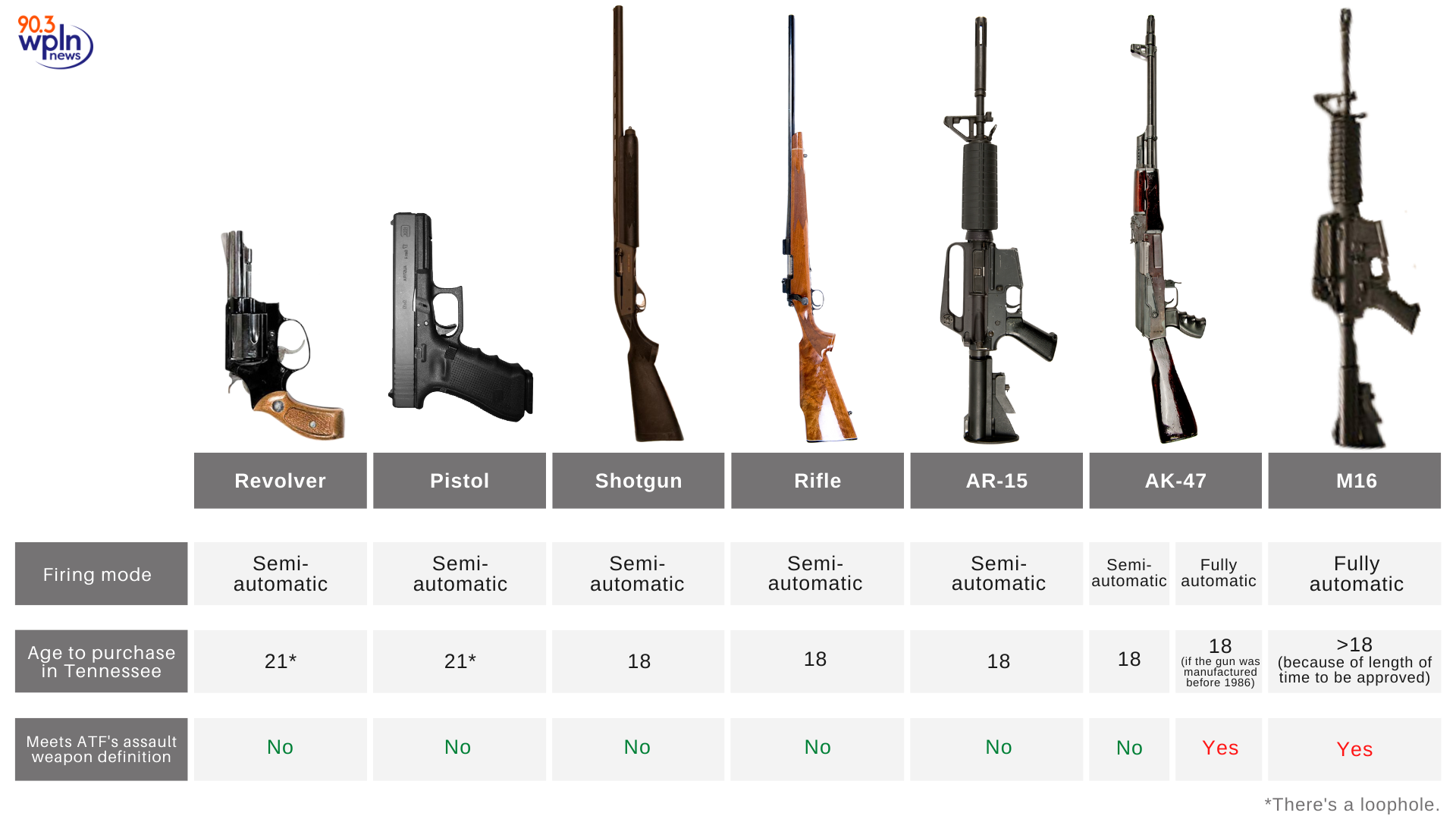
There are all sorts of firearms that you can legally own in Tennessee. Many of them fall into two categories: semi-automatic and fully automatic. Other firearms can be described as bolt-action, lever-action, pump-action and break-action.
More: How gun laws and gun violence impact Middle Tennessee
These guns are governed by federal laws that intersect with state rules. But, the interaction of those laws are complex, and federal legislators have both passed and are discussing new reforms that could change them.
How do semi-automatics and fully automatics differ?
Well, both semi-automatics and fully automatics describe a type of firearm action. The most obvious difference is the way they sound when fired.
A semi-automatic weapon fires one round after each trigger pull. It’s a lot different than a fully automatic — although sometimes similar in looks — which can run through an entire magazine with a single pull and hold of the trigger.
Basically, a semi-automatic goes pow-pow, while a fully automatic goes rat-tat-tat-tat.
“Tennessee does allow its residents to own fully automatic firearms,” says Leroy Farris, a Tennessee firearms instructor, “and they are regulated by the federal government.”
Who can buy what guns?
For the average gun buyer, semi-automatics are one of the most common and convenient guns to purchase. They usually price out to less than a couple thousand dollars and are widely available at gun shops.
Fully automatics, however, can cost tens of thousands of dollars.
They are also a lot harder to legally get your hands on. One reason is because federal law says fully automatics must be made before 1986 to buy or sell. It’s unlikely that an ordinary Tennessean can get their hands on one.
“You have to be fingerprinted. You have to have a check, and it take usually three to four to five to six months or more to get approved,” Farris says. “And you have to notify the local law enforcement officer in the community you live that you have those.”
But, the rules are much more simple for semi-automatics.
“Anyone can be, regardless of their age, gifted a rifle or a shotgun,” says Nashville attorney John Harris, “and they can inherit at any age.”
Harris, who’s also the executive director of the Tennessee Firearms Association, says although there’s a lot of freedom for Tennesseans to own semi-automatics, the law is layered.
Anyone eligible who’s at least 18 can walk into a gun store and purchase a shotgun or rifle — like the popular AR-15.
But, that’s not true for revolvers and pistols, which are types of handguns.
“A federally licensed dealer cannot transfer [a handgun] to someone who’s under the age of 21,” Harris explains.
Still, even then, there’s a loophole. Harris says Tennesseans at least 18 can legally buy handguns from unlicensed individuals, if they also live in Tennessee.
What are Tennessee’s carry laws?
Now, here’s when it gets tricky. Just because you can own a gun in Tennessee, it doesn’t mean you’re allowed to carry it.
“If you can legally own a long gun [shotgun or rifle], you can carry it openly, says Linda McFadyen-Ketchum of Moms Demand Action, “but it has to be unloaded.”
The definition of unloaded in Tennessee means neither in nor near the long gun. What this means is: Even if the rifle or shotgun you’re carrying doesn’t have a magazine or bullet in the chamber, it can still be considered loaded — if you have ammunition in your pocket. Individuals could technically walk around with an unloaded long gun, but many firearms experts say that it’s not a good idea to test the boundaries of that law.
So, while you can have a loaded long gun while engaging in a lawful activity, like hunting or attending a gun range, it’s illegal to stroll down Broadway with that same loaded firearm just for the heck of it.
John Harris says that Tennessee does allow you to transport long guns. You can also make stops.
“The statute says that you can leave the weapons secured in the vehicle, but it can’t be visible,” Harris says. “So, you got to put it in the trunk or cover it up.”
Now, the carry rules for handguns are more lenient, but also very complicated.
For one, you have different rules for people armed under the state’s permitless carry law, than those who get a license. The strongest license is called enhanced carry. The permit requires classroom and quick and basic range training. It also allows you to carry in many public parks. An enhanced license may also allow Tennesseans to carry their handguns in most other U.S. states.
What about “assault weapons?”
There is no simple definition for an “assault weapon.” When people use “assault weapon” to describe a firearm, they’re usually referring to a weapon capable of firing in fully automatic or burst mode. Fully automatic rifles are classified as machineguns by the Bureau of Alcohol, Tobacco, Firearms and Explosives.
The ATF, however, does consider some semi-automatic pistols, shotguns and rifles assault weapons — especially if they have a combination of certain features, including:
- A threaded barrel capable of excepting a silencer for pistols
- A “fixed magazine capacity in excess of 5 rounds, and an ability to accept a detachable magazine” for shotguns
- A bayonet mount or grenade launcher for rifles
Update: This story has been updated to include a graphic explainer and information about what qualifies as an assault weapon. You can also hear more in the Tuesday, July 26 episode of WPLN’s daily show This Is Nashville, which aired after this post’s publication.


